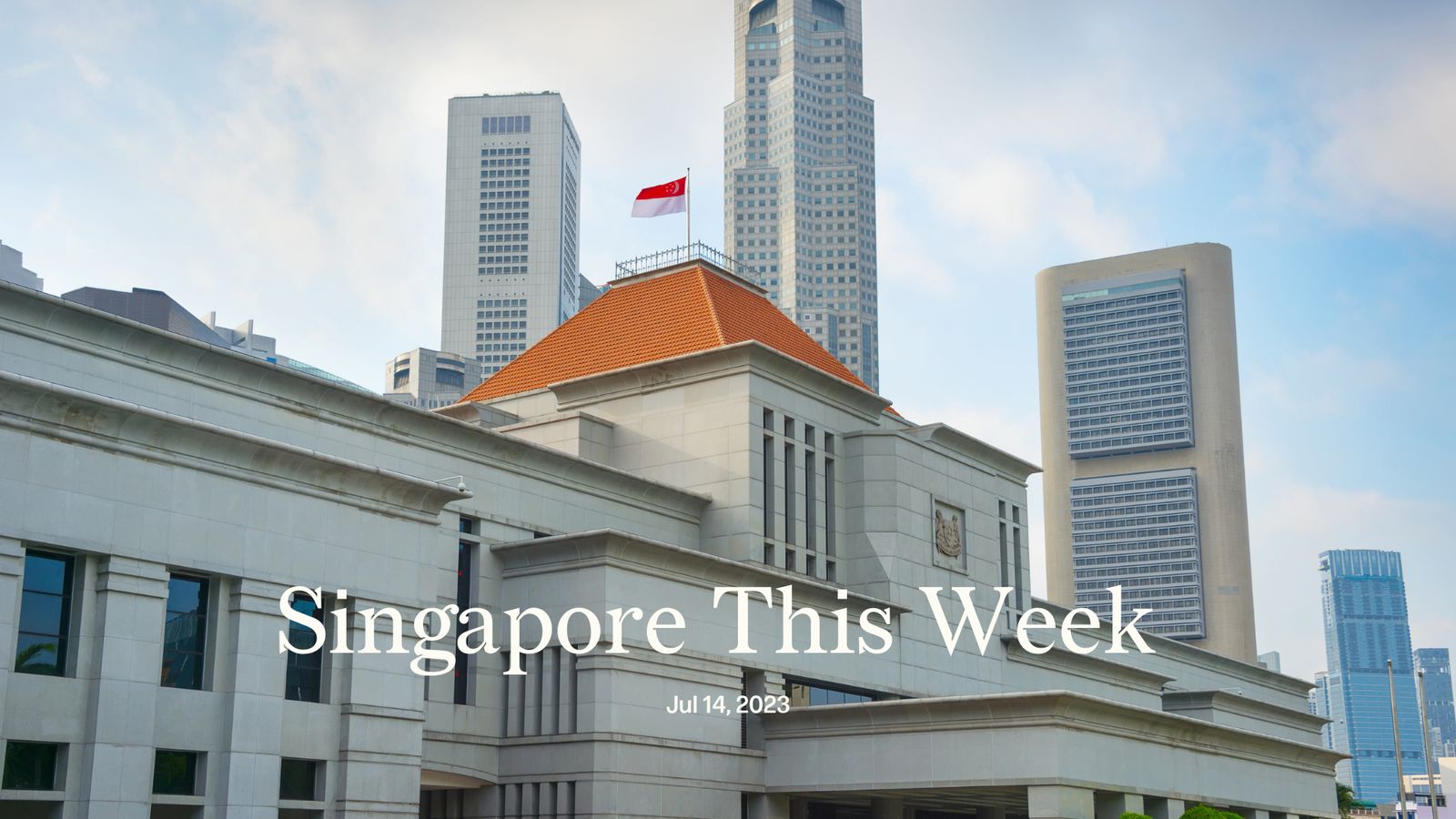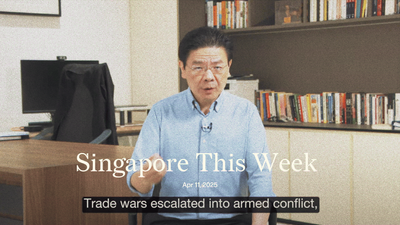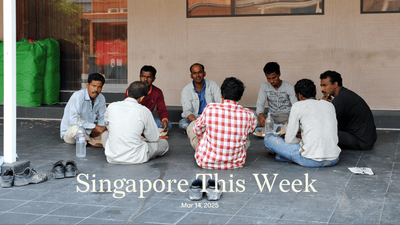Politics: Fucking populist
In April this year, Tan Chuan-Jin, Parliament’s speaker, labelled Jamus Lim of the Workers’ Party a “fucking populist” immediately after the latter made a speech in Parliament arguing for an official poverty line. Tan was caught on a hot mic, a video of which began circulating on TikTok and Reddit earlier this week. Though the speaker can maintain their party affiliation—unlike in some other democracies—they “...must remain impartial and fair to all MPs [members of parliament].” It’s hard to imagine how anybody outside his own ruling People’s Action Party (PAP) can now take him seriously in his job. (Tan did not reply to a request for comment.) Many online have also criticised his misunderstanding and misuse of the word “populist”. Tan posted a non-apology on Facebook that reads like it was composed by the “PAP-keeping-up-appearances” version of ChatGPT. He was sorry, not for smearing a fellow MP, but that he had done so “aloud” and in “unparliamentary language”. Apology processed, let’s return to exercising and posting selfies. This incident comes with the memory of PAP parliamentary elitism still fresh in voters’ minds. In 2021, Vivian Balakrishnan, foreign affairs minister, was also caught on a hot mic referring to Leong Mun Wai of the Progress Singapore Party (PSP) as an “illiterate” from a “lousy school”. Among others supporting Tan in this incident is Ho Ching, former boss of Temasek and wife of the prime minister, who shared a post saying Lim “...is exactly what you [Tan] described him as.” This increasingly small cabal of senior PAP members, cocooned by acolytes, is probably unaware that many Singaporeans find their elitism off-putting, particularly compared to the grace of Lim in accepting the apology. One hopes we also remember his articulate plea—that Singapore has been “remarkably recalcitrant in our willingness to support our poor”—not just the mindless, vulgar response by the speaker of the house, whose seeming dereliction of ethics and duties should, but probably won’t, signal his downfall. With each passing month, the PAP’s standards are dropping.
Politics: Gentlemen, start your engines
S Iswaran, Singapore’s transport minister, has been forced to take leave from his ministerial and parliamentary duties following the announcement that he is “assisting the Corrupt Practices Investigation Bureau (CPIB)” in an investigation—a classic Singaporean euphemism for “in deep shit”. Insider rumours are that it may concern his dealings with buddy Ong Beng Seng, a billionaire tycoon. Both had turbo-charged efforts to bring the Formula 1 race to Singapore in 2008 (and remain its chief advocates). CPIB informed Lee Hsien Loong, the prime minister, about its probe just two days after Parliament debated issues surrounding bungalow leases by K Shanmugam, home affairs and law minister and Vivian Balakrishnan, foreign affairs minister—which also involved its own CPIB investigation. Establishment analysts have been quick to draw a distinction between the CPIB probe into the Rajahs of Ridout and the one into the Rajah of F1—the latter much worse, apparently, because it was initiated by the CPIB independently. (The former was requested by Lee.) Set against the growing factionalism within the PAP, these two facts—the proximity to the previous probe, and the hard distinction being made between the two—may also fuel speculation that somebody within the party steered information about Iswaran to the CPIB. If so, was it some long-awaited putsch? An effort to distract from the other Rajahs? Or a sop to an electorate increasingly disgruntled with a series of scandals, including corruption at Keppel Offshore & Marine? If it were an inside job—there’s no evidence yet—it’s a highly risky electoral manoeuvre. Iswaran was the lead driver in the PAP’s West Coast team, which, against the PSP’s Tan Cheng Bock-led team, won in a close race at the last general election (GE). Desmond Lee, the junior minister who’s now in pole position, was quick to “assure residents of West Coast division” that he’ll keep serving them during Iswaran’s “leave of absence”. Given that the crucial next GE must be called by 2025, both Lees will be hoping that this is just a pit-stop to tune the party’s engine—and not a sign that it’s losing its grip.
Note: Ong has just been issued a notice of arrest in connection with the CPIB probe. He’s posted bail of S$100,000 and is travelling from today. He’s supposed to surrender his passport to CPIB when he returns.
Society: Quiet quitters, we want your heart
Has your productivity been hit since Covid-19? The term “quiet quitting” was coined during the pandemic to describe workers who shifted from going above and beyond at their job to doing the bare minimum. And some 35 percent of Singaporeans surveyed have done so, above the global average of 31 percent. (Human resources agency Randstad surveyed 35,000 workers aged 18 to 67 from 34 different countries last October.) Rather than working overtime without pay and replying to e-mails on Saturday mornings, quiet quitters simply clock in at 9am and clock out at 5pm, doing exactly what they are hired to do and not a smidge more. Randstad’s respondents cited a few reasons for this shift: 41 percent wanted to improve their work-life balance; 38 percent pointed to low compensation amid the rising cost of living; and 33 percent cited a lack of career growth opportunities. Quiet quitting can also be understood as an employee’s way of equalising the power imbalance between them and their employer—workers may not be able to change deeply entrenched wage structures in a large corporation, but they can reclaim their time and energy. When a Singaporean father of two found out he was earning thousands less than his expatriate colleagues, he told The Straits Times that he was “absolutely furious” from being “severely undercut”. Once a passionate engineer with almost 15 years of experience, he now does the minimum at work. Some CEOs have baulked at quiet quitters, spooked by the risk of sinking productivity and lower profits. “It’s an incredibly important aspect not only of retaining the body, but the heart, and we want both,” said Thierry Delaporte, CEO of Wipro, a tech multinational company. Before you know it, the highest-paid CEO in the Indian IT sector may want your soul too.
Society: It’s the way you talk, not what you say
England not powderful enough? No problem, according to “truly independent” presidential hopeful George Goh. As if to make the point, he explained: “Sometimes don’t need to speak perfect English, okay? It’s more authentic. If you speak perfect English, you cannot get the deal one.” Goh, founder of Harvey Norman Ossia, was referring to his success at pitching proposals to potential business partners, crediting his less-than-perfect English for possibly working in his favour. The 63-year-old businessman was speaking to about 120 entrepreneurs during a fireside chat at Singapore Management University. He joked: “When you want to sell to a billionaire [like say, Gerry Harvey, co-founder of Harvey Norman], don’t speak too well. Sorry I teach you the wrong way.” Instead, he believes that sincerity, trustworthiness, and a good character are more important for effective communication. Sound advice for would-be entrepreneurs perhaps. But will voters buy Goh’s justification for his English-speaking skills, if granted eligibility to run for president—a role that’s mostly ceremonial? For many online forum commenters, it could be a hard-sell. “He is inarticulate and won’t be a good representative on the international stage,” wrote one Reddit user. “There is no way I will accept him as President. His English is awful,” dismissed another. “I for one def don’t want someone incoherent to rep our country,” declared a third. And one asked, “Is he [Goh] saying he’s more authentic than Tharman [Shanmugaratnam], who is well-loved by his constituents?” Goh’s language proficiency aside, there’s still the question of whether he’s qualified to run for the Elected Presidency. Private-sector candidates must have served as CEO of a firm with at least S$500m in shareholders’ equity during their most recent three-year period. None of his companies, individually, meets that requirement. Goh’s workaround? Consider his businesses as one entity, because: “Anyway, it’s managed by me.” Goh might have been criticised for having a poor command of English, but he sure has a way with words.
History Weekly by Faris Joraimi
Today, July 14th, marks the 234th anniversary of the Storming of the Bastille, when an armed mob swept into a mediaeval fortress in Paris to seize the weapons stored there. Also a prison for political detainees, the Bastille symbolised the tyranny of France’s monarchy. Its fall is officially commemorated as the start of the French Revolution, whose contributing factors were varied and complex. Economic and social crises created widespread unrest, while the rise of liberalism during the Enlightenment provided a new political philosophy based on equality and individual rights, rather than the divine right of kings. The effects of the French Revolution, though oceans away, reverberated to our region. It brought Napoleon into power, and his subsequent invasion of Holland gave France indirect control over the Dutch colonies in Asia. Javanese rulers faced a new Dutch administration that was hostile to traditional hierarchies. Herman Willem Daendels, the governor-general of the Dutch East Indies (r. 1808-1811) and a commander in Napoleon’s army, embodied this revolutionary zeal. His more interventionist colonial policy contrasted with the previous, more collaborative approach of the Dutch East India Company (VOC). In many ways a global conflict, the Napoleonic Wars were also a pretext for Stamford Raffles’s capture of Java in 1811 from the Dutch. The Anglo-Dutch reconciliation in 1814, however, was later threatened by Raffles’s 1819 agreement with Johor rulers to set up shop in Singapore, which the Dutch regarded as being in their sphere of influence. The “globalisation” of the French Revolution suggests how seemingly progressive values don’t always translate well across contexts, as their most ardent followers often enacted oppressive policies in the name of humanitarian ideals. Raffles, himself a liberal child of the Enlightenment, often used its arguments to promote British imperialism in the Malay world.
Arts: Singaporean artists take Edinburgh
Three Singaporean productions will travel to Edinburgh this August. Ong Keng Sen’s “Trojan Women” will play the Festival Theatre at the prestigious Edinburgh International Festival alongside Grammy Award-nominated musician Anoushka Shankar and New York City’s Alvin Ailey American Dance Theater. “Trojan Women” is based on the Jean-Paul Sartre version of Euripides’s play about the suffering of women in the aftermath of war. Originally a co-commission by the Singapore International Festival of Arts and the National Theater of Korea, Ong’s production draws heavily from Korean musical forms like pansori and K-pop—unsurprising for the T:>Works (formerly TheatreWorks) founder, who’s best known for combining Western classics with Asian performance traditions. The other two Singaporean shows will feature at the Edinburgh Festival Fringe, the world’s largest arts festival. Gangguan Theatre will stage “Do Rhinos Feel Their Horns?”, an adaptation of Eugène Ionesco’s play “Rhinoceros”, which was first performed at Singapore’s Centre 42 in May. Artist couple Khai Ramli and Faizal Abdullah are presenting their performance-lecture “Siapa Yang Bawa Melayu Aku Pergi?/Who Took My Malay Away?”, which premiered at the VAULT Festival in London. Both teams have crowdfunded their expenses for the Fringe, which does not cover production costs. Despite the logistical difficulties of performing at the Fringe, the festival remains a valuable opportunity for independent artists to play to an international audience.
Arts: The Teenage Textbook author dies
Adrian Tan, litigator and president of the Law Society of Singapore, passed away this week at 57, after battling cancer for over a year. Outside the legal fraternity, Tan was better known for his two novels, The Teenage Textbook or The Melting of the Ice Cream Girl and The Teenage Workbook or The Passing of An April Shower, which were bestsellers in the late 1980s. The books are set in a fictional junior college and follow a group of students as they hurtle towards adulthood. In an essay for prose.sg, Samuel Lee reflects on the lack of critical attention paid to these two novels, arguing that they “track a certain sensibility within the decade that still holds as universal in the present.” Their enduring appeal is best evidenced by the multiple adaptations they’ve inspired: the stage play “The Teenage Textbook” by The Necessary Stage (1997), “The Teenage Textbook Movie” (1998), “The Teenage Textbook Musical” by Go! Theatre (2017), and the Mediacorp-produced “Teenage Textbook: The Series”, which updated the story for the 21st century (2021). Tan was also a member of the Arts House Limited board and a regular speaker at the Singapore Writers Festival. He will be missed.
Business: Temasek in the red
The past year has not been good for Temasek Holdings, the global investment company owned by Singapore’s government. First, the FTX blowup: Temasek held a 1 percent stake in the crypto exchange with an estimated amount invested of US$210m (S$278m). Its value reached US$320m (S$437m) at its peak in January 2022. Its senior management and investment team were punished with a pay cut for the reputational damage arising from the failed investment. More recently, Singapore biotech darling Tessa Therapeutics, which raised US$80m (S$106.2m) in a Temasek-led round in 2017, announced that it would wind down after failing to secure further funding. Looking at its larger portfolio, Temasek had invested S$31bn and divested S$27bn in the last financial year. However, net portfolio value fell 5.2 percent to S$382bn, from the record S$403bn it achieved a year ago, according to the latest review completed on March 31st. One-year total shareholder return decreased from 5.81 percent to -5.07 percent over the past year. Given that Temasek’s mandate is to invest for the long-term, it also reported its 10- and 20-year total shareholder returns, which stood at 6 and 9 percent respectively, down from 7 and up from 8 percent in the previous year. Beyond a series of unfortunate investments, Temasek representatives attributed the poor returns to “a fall in equity valuations, both in the public and private markets” amid “a challenging macroeconomic environment.” Nonetheless, the state-owned investment firm appears prepared to continue to invest in deals given its “strong liquidity position”. As Temasek’s contributions are important to the government’s annual budget, it’ll be interesting to see whether it can maintain its historical shareholder returns in this tougher macroeconomic environment.
Tech: The race to the peak
Since its breakup, Sequoia Capital’s new local entities have started moving into one another’s territories. HongShan, its former Chinese unit, was reported to be setting up a Singapore office. This puts it in direct competition with Peak XV Partners, the former unit of Sequoia India and South-east Asia. With over US$56bn (S$74.5bn) in assets, HongShan’s available capital easily dwarfs its South-east Asian sibling’s holdings of US$9.2bn (S$12bn). This could allow the Chinese firm to invest more aggressively as it builds its presence in the region, possibly displacing Peak XV from competitive deals. Given HongShan’s Chinese roots, it won’t be surprising if it facilitates a growing demand from Chinese start-ups to expand into Singapore so as to rebrand themselves as Singapore-based firms—a strategic trend prompted by US-China geopolitical tensions that have placed Chinese tech giants Bytedance and TikTok under fire. Beyond investment opportunities, there could also be competition for investment funds from Limited Partners: family offices, sovereign wealth funds, high-net-worth individuals, and so on. Over the last year, the number of wealthy Chinese setting up family offices in Singapore has soared. Peak XV, having to deal with inbound interest from its Chinese sibling, will no longer be king of the jungle in South-east Asia. It’s also exploring setting up a US office that will place it in competition with the mothership. Has Sequoia’s presence in South-east Asia peaked? Or is it just getting started, with the various geographical entities entering the fold? Either way, it’s founders who could ultimately benefit from the competition.
If you enjoy Jom’s work, do get a paid subscription today to support independent journalism in Singapore.








